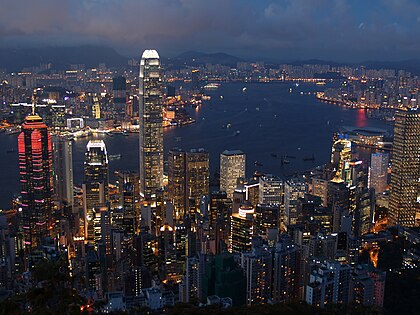IMF..........................WB...............................CIA
rank/measure.............rank/measure..............rank/measure
--/29,753.................--/29,845........................--/29,611

Central and Victoria Harbour of Hong Kong
| |
| Currency | Hong Kong dollar (HKD) |
|---|---|
| Fiscal year | 1 April – 31 March |
| Trade organisations | APEC and WTO |
| Statistics | |
| GDP | PPP: $325.755 billion (2011 est.) PPP per capita rank: 8th Nominal per capita rank: 25th (2010)[1] |
| GDP growth | 7.2% (2011 Q1)[2] |
| GDP per capita | HK$246,733; 2010 (US$50,936 PPP; 2012)[3] |
| GDP by sector | agriculture: (0.1%) industry: (9%) services: (90.9%) (2008 est.) |
| Inflation (CPI) | 2.4% (2010)[4] |
| Population below poverty line | N/A |
| Gini coefficient | 53.3 (2007) |
| Labour force | 3.2343 million (end-2010)[5] |
| Labour force by occupation | manufacturing (6.5%), construction (2.1%), wholesale and retail trade, restaurants, and hotels (43.3%), financing, insurance, and real estate (20.7%), transport and communications (7.8%), community and social services (19.5%) |
| Unemployment | 3.4% (1/2011 – 3/2011)[6] |
| Main industries | textiles, clothing, tourism, banking,shipping, electronics, plastics, toys, watches, clocks |
| Ease of doing business rank | 2nd[7] |
| External | |
| Exports | $390.4 billion (2010) |
| Main export partners | |
| Imports | $433.5 billion (2010) |
| Main import partners | |
The Hong Kong Stock Exchange is the 6th largest in the world, with a market capitalisation of about US$2.97 trillion. In 2006, the value of initial public offeringsconducted in Hong Kong was second highest in the world after London.[36] In 2009, Hong Kong raised 22 percent of worldwide initial public offering (IPO) capital, becoming the largest centre of IPOs in the world.[37] The rival stock exchange of the future is expected to be the Shanghai Stock Exchange. As of 2006, Hong Kong Exchanges and Clearing (HKEX) has an average daily turnover of 33.4 billion dollars, which is 12 times that of Shanghai.[36]
Economic predictions[edit]
Since the 1997 handover Hong Kong's economic future became far more exposed to the challenges ofeconomic globalization and direct competition from mainland China.Shanghai claimed in particular to have a geographical advantage, and a municipal government that dreamt of turning the city into China's main economic centre by as early as 2010. The target is to allow Shanghai to catch up to New York by 2040–2050.[38] Hong Kong, on the other hand, continues to have a more positive and realistic approach, and remains the principal international financial centre in China. Until then, Hong Kong is expected to have higher overall economic figures yearly. Hong Kong's main trading partners are China, the United States, Japan, Taiwan, Germany, Singapore, and South Korea..
